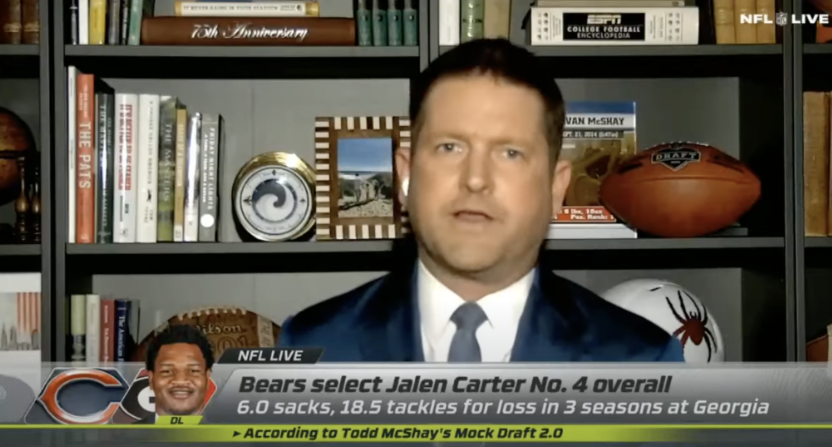The NFL Scouting Combine is next week, and the NFL Draft is two months away, so brace yourself for a lot of information and misinformation.
It can be difficult to discern what is truth and what is deception. Teams, agents, and players like to get their messages out, and the media can be a useful tool for their benefit. This cloak-and-dagger approach has existed for decades as everyone jockeys to get the upper hand. It has only intensified in the social media age where it is easier than ever to leak details that may or may not be factual.
Jalen Carter is projected by some, including ESPN‘s Mel Kiper, to be the first overall pick in the draft. Recently, Bruce Feldman of The Athletic wrote about the Georgia defensive tackle and included a heartwarming gesture by Carter, who used his scholarship money to pay for meals for walk-on defensive lineman Weston Wallace.
Carter’s selfless act was universally applauded, as it should be. But Feldman’s article also reminded us of what ESPN’s Todd McShay said about Carter before the national championship game. McShay brought up vague “character issues,” suggesting that Carter might not be well-liked in the locker room.
This is not the first time McShay’s criticism of a college player has been scrutinized. In December, he unnecessarily sideswiped Ohio State wide receiver Jaxon Smith-Njigba questioning the severity of an injury. With Carter, according to The Athletic, McShay said: “Does he get along with everybody? What’s he like to deal with in the locker room? Those sorts of issues. I know it’s early in the process, but I’m forewarning everybody out there.”
As a draft analyst, McShay is well within bounds to bring up reasonable concerns that he believes may impact the team that drafts Carter. However, where McShay erred was not giving specifics. He didn’t elaborate on what those character issues are. Instead, he threw out an unsubstantiated accusation and put the onus on us to decipher the meaning.
So, what are we to make of Feldman’s portrayal vs. McShay’s portrayal? Is Carter a great teammate or a suspect one? And regardless of the answer, does it even matter for a young man who is still maturing physically, mentally, and emotionally? Perhaps we’re asking the wrong questions. Maybe we should be focusing on why draft analysts aren’t being held more accountable.
McShay smeared a 21-year-old who is trying to land a job without presenting any evidence. At the bare minimum, ESPN should have demanded that McShay give clear-cut examples. He should have provided more context to validate his assessment.
Draft analysts like McShay and Kiper wield considerable influence on how players are perceived by the public. Often, their observations of these athletes are how many of us first get to know them; their strengths, weaknesses, and potential. Now, for some people, Carter’s name will be synonymous with “character issues.” That’s harsh and unfair for a two-time national champion.
Another question to ponder is why did McShay say this about Carter? Often NFL teams will put out negative information about a prospect in the hopes that another franchise will become gun-shy and pass on him. Agents leak stuff too. It’s part of the draft strategy. That happens all the time, but that doesn’t make it right.
There is a fine line. It’s incumbent on experts to explain why a player is falling in the draft. However, it’s also the responsibility of experts to recognize when they’re being used for someone else’s gain.
There are a lot of conflicts of interest at play too. Some media members and draft analysts share representation with the players and team executives they cover. That’s where a lot of this stuff becomes murkier and murkier.
All we can do as consumers of the information is repeatedly call out the experts and demand that they be held to a higher standard of accountability, especially when it comes to questioning an athlete’s character without anything tangible to back it up.






